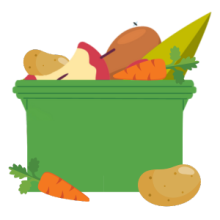A food waste diary helps to identify what foods are wasted more often in your home and how much is thrown away.
Think about:
- the type and amount of each food thrown away
- why it was thrown away (for example, gone mouldy, cooked too much, passed the ‘use-by’ date)?
- how you disposed of it (for example, in your food recycling caddy or compost bin)
Once you've an idea of the waste created, you can consider the following:
- how often you need to buy certain items
- if you can reduce how much you buy by choosing to buy loose
- finding out how to store particular foods to make them last
- if you can freeze an item, or buy an item frozen to start with to keep it fresh
- looking up recipes to use up regularly wasted foods
- if you can recycle it in your food recycling or compost it instead of throwing away in the bin


